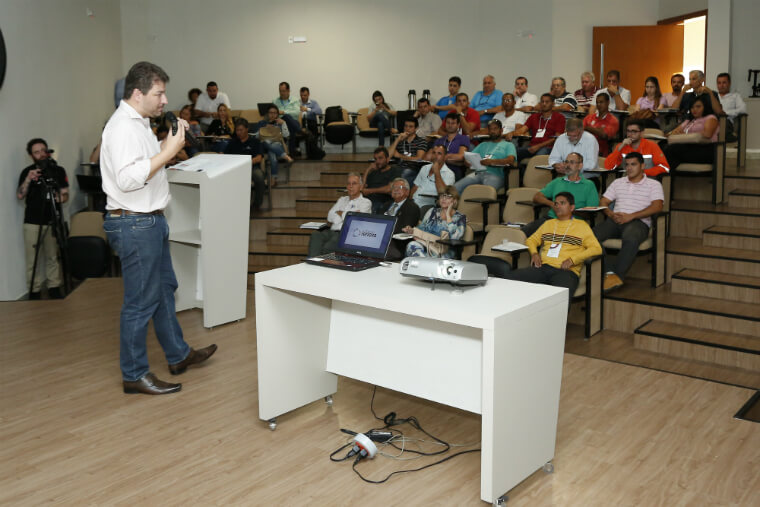At least 3.8 thousand jobs will be generated in the region from Bento Rodrigues to Santa Cruz do Escalvado by 2020
The Renova Foundation seeks to prioritize in its actions the contracting of labor and local services in the municipalities impacted by the collapse of the Fundão dam in Mariana (MG). The repair works, which should deploy R $ 4.6 billion in Minas Gerais by 2020, require local companies prepared to meet this demand for products and services.
The premise is to use 70% of the region’s own workforce, as well as allocate 50% of the invested amount in contracting local companies. To guarantee this goal, the Foundation will offer a Series of Talks for entrepreneurs. In Minas Gerais, these events will take place in the municipalities of Barra Longa, Doce River, Santa Cruz do Escalvado, Mariana, Governador Valadares and Aimorés.
The meetings are open, free and have the objective of preparing micro and small businesses, or people who are interested in new business, to meet the requirements, such as health, safety, supplies, transparency actions and financial planning.
This initiative will be carried out in partnership with the Minas Gerais State Industry Federation (Fiemg), Minas Gerais Development Bank (BDMG), the National Employment System (Sine), the local Shopkeepers’ Chambers (CDLs) and trade associations. These entities will be present at the events as consultants to answer questions and to facilitate the structuring of these small companies.
At the events companies can also get registered. “The idea is to form a data base of local suppliers for the Foundation’s procurement and contracting processes. These measures have the objective of ensuring that the resources are invested in the impacted towns and are reverted in economic development”, says the leader of the Stimulation of Local Contracting actions of the Renova Foundation, Paulo Rocha.
In the first session, this April, consultants visited 10 locations in Minas Gerais and Espirito Santo, presenting information on business management for micro and small entrepreneurs.

Entrepreneurs take part in a Series of Talks to learn about the contracting requirements of the Renova Foundation. | Photo: Fabrício Santos
EMPLOYMENT
The Renova Foundation carried out a mapping along the Doce River basin, which outlined the profile, vocations and economic potential of each town, from Mariana (MG) to Regência (ES). The initial forecast is that at least 3,800 direct and indirect jobs will be generated in the region of Bento Rodrigues to Santa Cruz do Escalvado, by 2020.
Considering the direct and indirect contracting for the repair actions and also the network of suppliers, this number should reach 9 thousand jobs in this region. The investments will be in actions of resettlement, recovery of springs, management of tailings, reforestation and treatment of water and sewage.
This work opens space for new business. The mapping indicates that sectors such as construction, environment and reforestation, agribusiness, trade and service have strong development potential. To empower the workforce, the Renova Foundation has partnered with Senai to provide free training courses. In the Mariana region, for example, this work in partnership has already begun.
MAPPING
The Renova Foundation carried out a mapping along the Rio Doce basin on local economy and employment and income generation. The study divided the impacted area, from Minas Gerais to Espirito Santo, into three regions, defined by similarities in the economic profile:
- Region 1: Mariana, Barra Longa, Santa Cruz do Escalvado and Rio Doce
- Region 2: Ipatinga, Belo Oriente, Governador Valadares, Naque, Tumiritinga, Resplendor, Aimorés, Conselheiro Pena and other nearby towns;
- Region 3: Espirito Santo (Baixo Guandu, Marilândia, Colatina and Linhares).
Potential businesses have also been identified in the coming years:
- Construction: building construction, earthworks, infrastructure, water and sewage networks, project engineering;
- Metalworks: manufacture of metal structures, boilermaking, manufacture of tanks, silos and pipes, engine overhaul and vehicle maintenance;
- Environment and reforestation: environmental management and control services, reforestation, recycling;
- Agribusiness: food production (fruit growing, vegetables), livestock (meat and milk);
- Trade: computer equipment, stationery, automotive parts, tires, pharmacy, office supplies, construction material, fertilizers, seedlings and fences, uniforms and PPE’s;
- Service: hospitality, meals, professional qualification, environmental services (monitoring of waste transport, landscaping and gardening), health, graphics, automotive maintenance, heavy machinery maintenance and road transport;
- Tourism: business tourism, leisure tourism and ecological tourism.
